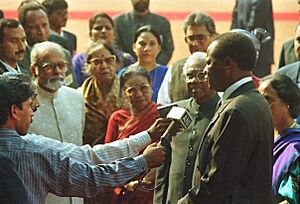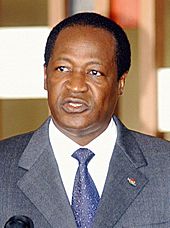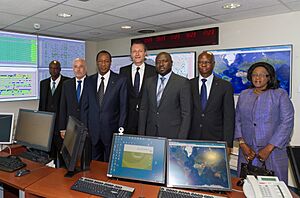Blaise Compaoré facts for kids
Quick facts for kids
Blaise Compaoré
|
|
|---|---|
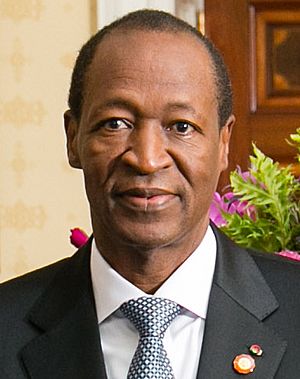
Compaoré in 2014
|
|
| 2nd President of Burkina Faso | |
| In office 15 October 1987 – 31 October 2014 |
|
| Prime Minister |
See list
Youssouf Ouédraogo
Roch Marc Christian Kaboré Kadré Désiré Ouedraogo Paramanga Ernest Yonli Tertius Zongo Luc-Adolphe Tiao |
| Preceded by | Thomas Sankara |
| Succeeded by |
|
| Minister of Justice | |
| In office June 1985 – 15 October 1987 |
|
| President | Thomas Sankara |
| Preceded by | Raymond Poda |
| Succeeded by | Salif Sampebogo |
| Personal details | |
| Born | 3 February 1951 Ziniaré, Upper Volta, French West Africa |
| Citizenship |
|
| Political party | CDP (since 1996) |
| Other political affiliations |
ODP–MT (1989–1996) |
| Spouse |
Chantal Terrasson de Fougères
(m. 1985) |
| Relations | François (brother) |
| Parents |
|
| Nickname(s) | Handsome Blaise — Military service —> |
| Signature |  |
| Military service | |
| Allegiance |
|
| Years of service | 1971–1987 |
| Rank | Captain |
| Battles/wars | Agacher Strip War |
Blaise Compaoré (born 3 February 1951) is a politician and former military officer from Burkina Faso. He was the second president of Burkina Faso from 1987 until 2014. He was the longest-serving president in his country's history. Before becoming president, Compaoré was the Minister of Justice from 1985 to 1987.
Blaise Compaoré was born in Ziniaré. He joined the military in 1971 when he was 20 years old. He became good friends with Thomas Sankara, who was the first president of Burkina Faso. Sankara made Compaoré the Minister of Justice in 1985. In 1987, Compaoré led a coup d'état (a sudden takeover of the government) where Sankara was killed. Compaoré became president at 36, making him one of the youngest presidents in Burkina Faso's history.
After becoming president, Compaoré changed many of Sankara's policies. He created a new political party called the Congress for Democracy and Progress (CDP) in 1996. Compaoré won several elections between 1991 and 2010. In 2014, he tried to change the country's rules to stay in power longer. This led to a large protest, and he had to resign and leave the country. In 2022, a court found him responsible for Sankara's death and sentenced him to life in prison.
Compaoré's time as president is seen in different ways. Some people say he brought stability and progress to the country. Others criticize his actions regarding human rights and fairness.
Contents
Early Life and Military Career
Blaise Compaoré was born in Ziniaré, in a place then called French Upper Volta, on 3 February 1951. His father fought in World War II. Blaise went to a Catholic school and then a high school in Ouagadougou. He lost both his parents when he was young. After that, he became very close to the family of Thomas Sankara.
After high school, Compaoré joined the military. He continued his training at a military academy in Cameroon. There, he met Henri Zongo. Later, he met Thomas Sankara, and they became close friends.
Compaoré played a big part in the government takeovers against Saye Zerbo and Jean-Baptiste Ouedraogo. He married Chantal Compaoré in 1985. Under Thomas Sankara's leadership from 1983 to 1987, Compaoré was his assistant and served as Minister of Justice.
How Compaoré Came to Power
Compaoré was involved in the 1983 and 1987 government takeovers. He took power after the 1987 event, where his friend and predecessor, Thomas Sankara, was killed. He was later elected president in 1991, 1998, 2005, and 2010.
The 1983 Takeover
On 4 August 1983, Compaoré helped organize a takeover that removed Major Jean-Baptiste Ouedraogo from power. This event was supported by Libya. Other important people involved were Captain Henri Zongo and Captain Thomas Sankara, who became president.
During a border conflict with Mali in December 1985, called the Agacher Strip War, Compaoré led soldiers. They used special fighting methods against Malian tanks.
Presidency (1987–2014)
The 1987 Takeover
Compaoré took power on 15 October 1987. This was during a takeover where Thomas Sankara was killed. The reason given for this change was problems with France and the neighboring Ivory Coast. Compaoré said Sankara's death was an "accident." However, the details of what happened were never fully investigated. After becoming president, he changed many of Sankara's policies. He said his new approach was a "correction" for the country.
At first, he ruled with Henri Zongo and Jean-Baptiste Boukary Lingani. But in September 1989, these two were arrested. They were accused of planning to overthrow the government and were executed.
First Years and the 1990s
In October 1987, Compaoré and others formed a new political group called the Popular Front. He promised to continue the country's goals but change policies he thought were wrong.
In September 1989, there were rumors of a plot to overthrow Compaoré's government while he was away. The people involved were arrested. This led Compaoré to reorganize the government. In 1990, he started some democratic changes. In June 1991, Compaoré announced that Burkina Faso would get a new constitution.
In the 1990s, Compaoré supported rebel groups in Sierra Leone during their civil war. This war caused many deaths over 11 years. Compaoré was elected president in 1991. However, many opposition parties did not participate in the election because they felt it was unfair. Only about 25 percent of voters cast their ballots. In 1998, Compaoré was re-elected president.
Between 1998 and 1999, there were many protests and riots in Burkina Faso. People were upset about economic problems. These events were a big challenge for Compaoré's government.
The 2000s
Compaoré agreed to work with the United Nations to control weapons exports. This happened after claims that his government was involved in smuggling weapons to rebels in Sierra Leone and Angola.
In 2003, several people were arrested. They were accused of planning to overthrow Compaoré. A trial took place in April 2004, and they were found guilty. Many people gathered outside the court to support those accused.
In August 2005, Compaoré said he wanted to run for president again. Some politicians said this was against the country's rules. A rule made in 2000 limited a president to two terms, each lasting five years. However, Compaoré's supporters argued that this rule did not apply to him yet. In October 2005, the constitutional council agreed. They said the rule would not apply to Compaoré until his second term ended. This allowed him to run in the 2005 election.

On 13 November 2005, Compaoré was re-elected president. He won with over 80 percent of the votes, defeating 12 other candidates. He was sworn in for his new term on 20 December 2005.
In 2008, many protests happened because of high living costs. People wanted higher wages. Compaoré responded by temporarily removing taxes on food imports. He also increased supplies of water and electricity.
Final Years in Power (2010-2014)
President Compaoré announced a new Senate with 89 members. He would choose 29 of these senators, and local politicians would choose the rest.
2011 Protests
On 14 April 2011, reports said Compaoré had left the capital city, Ouagadougou. This happened after military bodyguards started a revolt over unpaid money. Their actions spread to the presidential area and other army bases. Gunfire was heard, and soldiers looted shops in the city.
Fall from Power
The 2014 Uprising
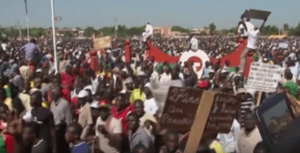
In June 2014, Compaoré's political party, the Congress for Democracy and Progress (CDP), asked him to hold a vote. This vote would allow him to change the constitution and run for president again in 2015. Without this change, he would have to step down because of term limits.
On 30 October 2014, the National Assembly was going to discuss this change. People who were against it protested by storming the parliament building in Ouagadougou. They started fires inside and took things from offices. Smoke was seen coming from the building.
Compaoré reacted by stopping the proposed changes. He dissolved the government and declared a state of emergency. He offered to work with the opposition to solve the problem. Later that day, the military announced it would set up a temporary government. They said the National Assembly was dissolved and that the country would return to normal rules within a year. Compaoré said he was ready to leave office after this temporary period.
On 31 October, Compaoré announced he had left the presidency. He said there was a "power vacuum" and called for a "free and transparent" election within 90 days. An officer from the presidential guard, Yacouba Isaac Zida, then took over as interim head of state. Compaoré then fled to Ivory Coast.
A week later, Compaoré gave an interview. He claimed that "part of the opposition was working with the army" to plan his overthrow. He said that "history will tell us if they were right."
The first head of state who stayed in office for a longer time after Blaise Compaoré was Roch Marc Christian Kaboré, starting on 29 December 2015.
International Role
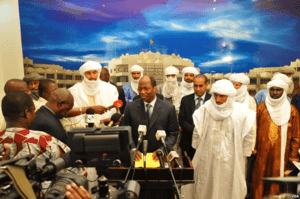
Compaoré played a role in solving problems in the region. In 2006, he helped mediate talks in Togo, which led to an agreement between the government and opposition groups.
He also helped solve a crisis in Ivory Coast. He brought the Ivorian president and a rebel leader together for a peace agreement in 2007. In 2012, he hosted talks to discuss peace for a conflict in Mali.
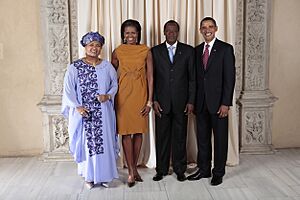
In 2014, the BBC noted that he was a strong ally to France and the United States in the region. He used his connections to help Western powers fight against extremist groups in the Sahel region.
Legal Outcome
In April 2021, a military court in Burkina Faso charged Compaoré with the 1987 murder of Thomas Sankara. He was not present for the trial. Another trial against him, for attacking state security and other charges, began on 11 October 2021. In April 2022, he was found guilty and sentenced to life in prison.
Honors
See also
 In Spanish: Blaise Compaoré para niños
In Spanish: Blaise Compaoré para niños
 | Frances Mary Albrier |
 | Whitney Young |
 | Muhammad Ali |


